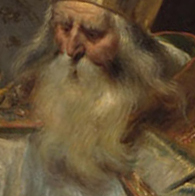David and Zadok the Priest

One of my readers asked me: Was Zadok a Jebusite? Since it was difficult to respond to his question in a simple sentence, I decided to write this post giving the reasons I believe Zadok was a Jebusite and not an Israelite.
Scholars differ on whether Zadok, who served as the priest under David and Solomon, was an Israelite or a Jebusite. There are many issues related to Zadok and his genealogy.
Writing in the Anchor Bible Dictionary, George W. Ramsey wrote:
“Zadok’s genealogy constitutes a problem which has long puzzled scholars. If Zadok’s father Ahitub was the brother of Ichabod (1 Sam 14:3), this would incorporate Zadok into the family of Eli. This would make Zadok brother to Ahimelech and uncle of Abiathar (1 Sam 22:2. This genealogy, however, conflicts with the point of 1 Sam 2:27–36 and 1 Kgs 2:26–27, which seek to explain how it came about that Zadok’s family superseded the family of Eli in the priestly service.”
“Another tradition, traced in detail in 1 Chr 5:29–34; 6:35–38 (English: 6:3–8, 50–53), also posits Ahitub as Zadok’s father but derives both from a line which does not include Eli. In the Chronicler’s version Zadok derived from a line descended from Aaron’s son Eleazar, and 1 Chr 24:3 specifically contrasts his descent from Eleazar with the descent of his co-priest Abiathar from another son of Aaron, Ithamar” (ADB 6: 1034)
Another issue, one that has a direct relation to the question asked by the reader, is the reason David appointed two priests and how Zadok attained a position of influence in the reign of David. Zadok association with David begins after David conquered Jerusalem.
When David subjugated the Canaanite population that has not been conquered in the days of Joshua and during the period of the Judges, he put them to forced labor (2 Samuel 20:24). Later on, the writer of Kings declared that the remnant of the Canaanite population was still under forced labor in the days of Solomon:
“All the people who were left of the Amorites, the Hittites, the Perizzites, the Hivites, and the Jebusites, who were not of the people of Israel – their descendants who were left after them in the land, whom the people of Israel were unable to destroy utterly – these Solomon made a forced levy of slaves, and so they are to this day” (1 Kings 9:20-21).
The remnant of the Canaanite population did not become Israelites, worshiping the God of Israel. They kept their religion and maintained the worship of their God. When David conquered Jerusalem from the Jebusites, the population of the city was not eliminated. To the contrary, the Jebusite population constituted the majority of those living in the new capital, the city of David.
According to the book of Genesis, Melchizedek king of Jerusalem, was also a priest of El Elyon, “God Most High” (Genesis 14:18). The meaning of the name Melchizedek is “My King is [the god] Zedek.” In the book of Hebrews, the name Melchizedek is interpreted to mean “King of Righteousness” (Hebrews 7:2).
Another king of Jerusalem is called Adonizedek (Joshua 10:1). The meaning of the name Adonizedek is “My Lord is [the god] Zedek.” Thus, the name Zedek and Zadok are associated with the Canaanite god Zedek.
When David conquered Jerusalem and made it the capital of the United Monarchy, he named the city after himself, “the City of David” (2 Samuel 5:7, 9). He became the king of Jerusalem and also assumed the duties of the priest of the cult there. This is the meaning of the expression in Psalm 110: 4: “You are a priest for ever after the order of Melchizedek.”
David and his descendants offered sacrifice in Jerusalem because they were priests. They were priests not because they were Levites, but because they were priests after the tradition established by Melchizedek, king of Jerusalem.
Thus, David appointed Abiathar to serve as the priest for the Israelite population and Zadok to be the priest for the Canaanite population who lived in Jerusalem. Zadok also served in the Tabernacle that was at Gibeon (1 Chronicles 16:39). The Gibeonites were the Canaanite people who deceived Israel in the days of Joshua (Joshua 10:1).
After Abiathar was banished to Anathoth, Zadok became the sole priest for the nation. Eventually, Zadok is classified as a Levite since the Levites were people consecrated to religious duty. Samuel was an Ephraimite and also a Levite.
Several scholars have rejected the view that Zadok was a Jebusite on the grounds that David would not appoint a pagan priest to the service of Yahweh. However, it is possible that eventually Zadok became a Yahwist.
The fact is that, in early Israel, many people identified Yahweh with Baal. Saul’s son was named Eshbaal, “Man of Baal” (1 Chronicles 8:33) and one of David’s sons born in Jerusalem was called Beeliada, “Baal Knows” (1 Chronicles 14:7). In addition, the name of one of the soldiers who served in David’s army was Bealiah, “Baal is Yahweh.”
These are some of the reasons that point to the fact that Zadok was a Jebusite who later became a follower of Yahweh.
Claude Mariottini
Emeritus Professor of Old Testament
Northern Baptist Seminary
NOTE: Did you like this post? Do you think other people would like to read this post? Be sure to share this post on Facebook and share a link on Twitter or Tumblr so that others may enjoy reading it too!
I would love to hear from you! Let me know what you thought of this post by leaving a comment below. Be sure to like my page on Facebook, follow me on Twitter, follow me on Tumblr, Facebook, and subscribe to my blog to receive each post by email.
If you are looking for other series of studies on the Old Testament, visit the Archive section and you will find many studies that deal with a variety of topics.




